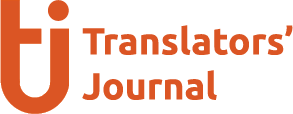
As a freelance translator, you know the struggle of balancing productivity with the flexibility and independence of your work. It’s easy to get sidetracked by distractions or overwhelmed by deadlines. But don’t worry, you’re not alone.
In this article, I will share 19 effective strategies to help you enhance your productivity, improve your work-life balance, and achieve greater success in your translation career.
1. Specialize
Specializing in a specific field of translation can significantly boost your productivity. By focusing on a particular niche, such as legal, medical, or technical translation, you can:
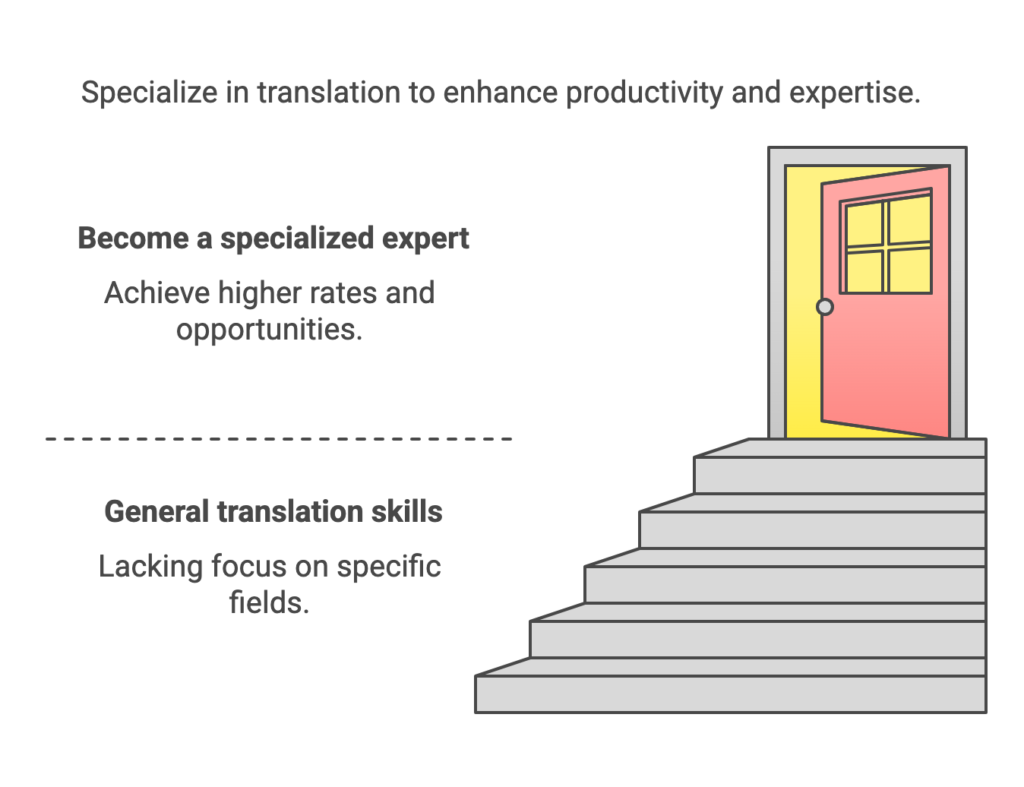
- Become an expert: Develop a deep understanding of the subject matter, terminology, and cultural nuances specific to your chosen field.
- Translate faster: Reduce search time for vocabulary and navigate the text more efficiently.
- Improve accuracy: Benefit from a strong term bank and avoid common translation errors.
- Command higher rates: Differentiate yourself from competitors and charge premium rates for your specialized expertise.
- Expand your portfolio: Showcase your specialized skills and attract clients seeking translators with domain knowledge.
By specializing, you can not only enhance your productivity but also open up new opportunities and increase your earning potential as a freelance translator.
2. Create a Productive Workspace
By creating a productive workspace, you can set the stage for focused and efficient work, ultimately improving your overall productivity as a freelance translator.
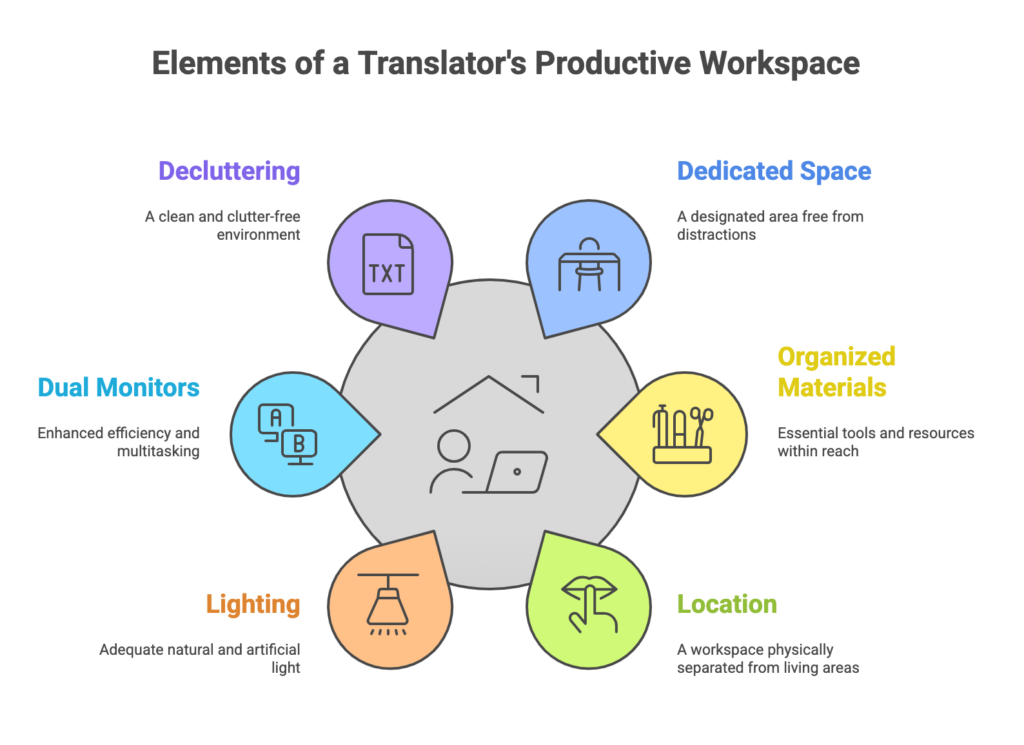
- Designate a Dedicated Space: Establish a designated workspace that is free from distractions and interruptions.
- Organize Your Materials: Keep your workspace organized with essential tools and resources within reach.
- Location: Ideally, have your home office physically separated from other areas of your home. If not possible, create a distinct workspace within your living space.
- Lighting: Ensure adequate lighting, both natural and artificial, to reduce eye strain and improve focus.
- Dual Monitors: Consider using dual monitors to enhance efficiency and multitasking, especially for tasks like research and translation.
- Decluttering: Keep your workspace clean and clutter-free to minimize distractions and create a sense of calm.
- Ergonomics: Invest in ergonomic furniture and equipment to ensure your comfort and prevent physical discomfort.
- Plants: Incorporate plants into your workspace to improve air quality, reduce stress, and create a more pleasant environment.
3. Form a Routine
With a routine in place, you can create a structured and productive work environment, reducing stress and improving your overall efficiency as a freelance translator. Here are a few things to consider when you are establishing your productive routine:
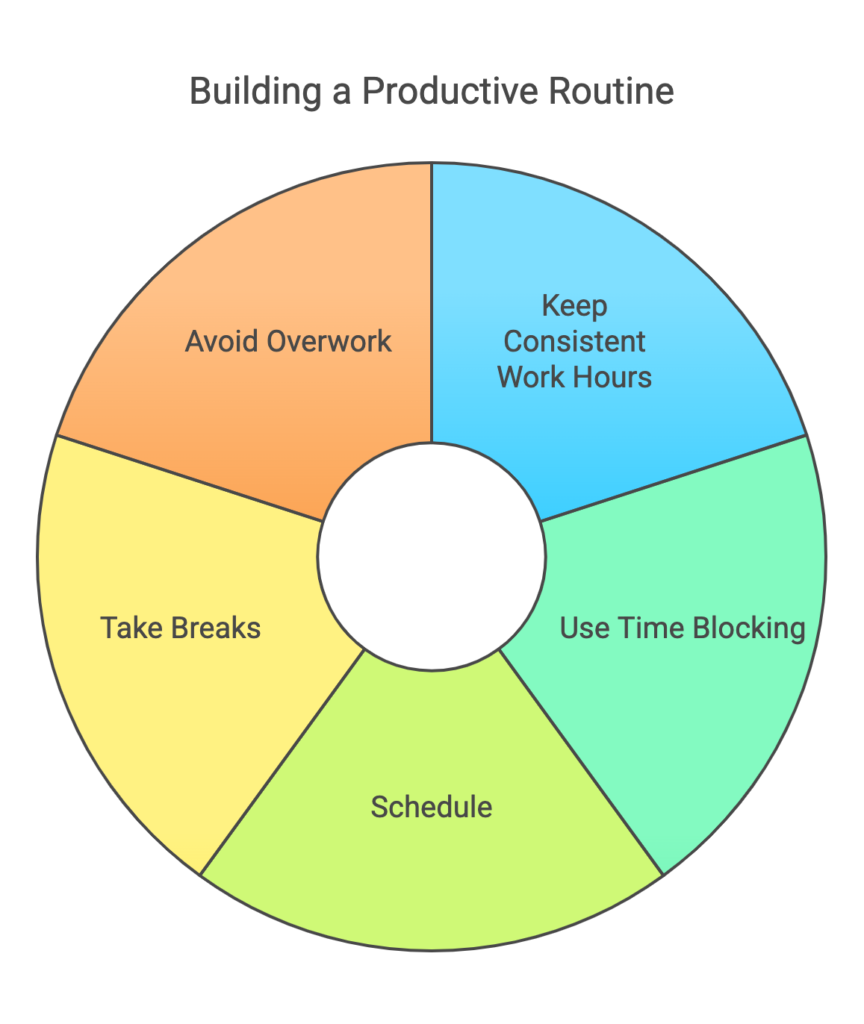
- Establish Consistent Work Hours: Set regular work hours to create a structured schedule and maintain discipline. This helps you avoid procrastination and stay focused on your tasks. When you know you are going to shut down your work day at 5 pm, you are going to be productive.
- Time Block: Allocate specific time blocks for different tasks to prioritize and manage your workload effectively. This can help you avoid multitasking and improve your concentration.
- Have a Daily or Weekly Schedule: Create a detailed daily or weekly schedule to plan your tasks and allocate time for each. This helps you stay organized and avoid feeling overwhelmed.
- Take Breaks: Incorporate short breaks throughout your workday to avoid burnout and maintain focus. Taking regular breaks can help prevent mental fatigue and improve your overall productivity.
- Avoid Overwork: Set realistic goals and avoid overworking yourself. Taking breaks and prioritizing your tasks will help you maintain a sustainable work-life balance.
4. Minimize Distractions
Minimizing distractions is essential for maintaining focus and achieving your goals as a freelance translator. Identify what distracts you. Put some plan to minimize those distractions. For freelance translators like us, it’s tough to get rid of emails or social media altogether. But still they need to be regulated in a way that does not hinder productivity. Here are a few things I find useful:
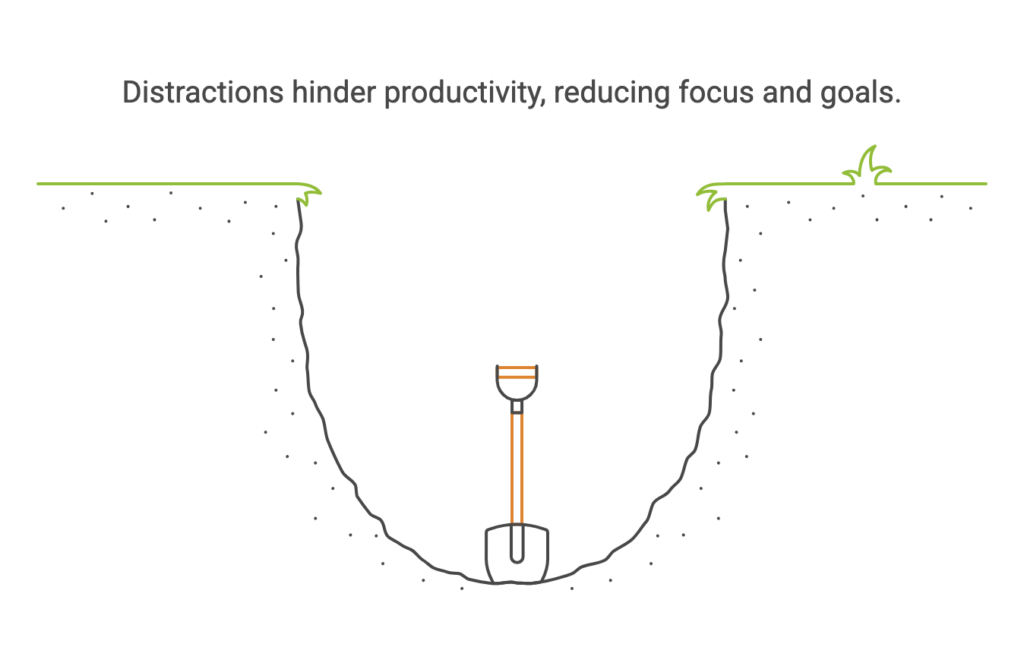
- Identify Distractions: Pinpoint the specific distractions that disrupt your workflow, whether it’s social media notifications, emails, or household chores.
- Schedule Specific Time for Checking Emails & Social Media: I usually check my emails twice: once after finishing my morning deep focus hours and one in the afternoon. These are the times when I check social media feeds and messages but never more than 15 minutes.
- Set Boundaries: Establish clear boundaries between work and personal time. This can help you avoid distractions and maintain focus during work hours.
- Use Noise-Canceling Headphones: Invest in noise-canceling headphones to create a quiet and focused working environment. This can help you block out external distractions and improve your concentration.
- Create a Focused Work Environment: Minimize distractions in your physical workspace by decluttering, closing unnecessary tabs or windows, and creating a calming atmosphere.
Here are some strategies you can implement. Your goal is to effectively manage distractions and create a more conducive environment for productive work.
5. Dress for Work
Dressing for work, even when working from home, can significantly impact your productivity as a freelance translator. Here’s why:
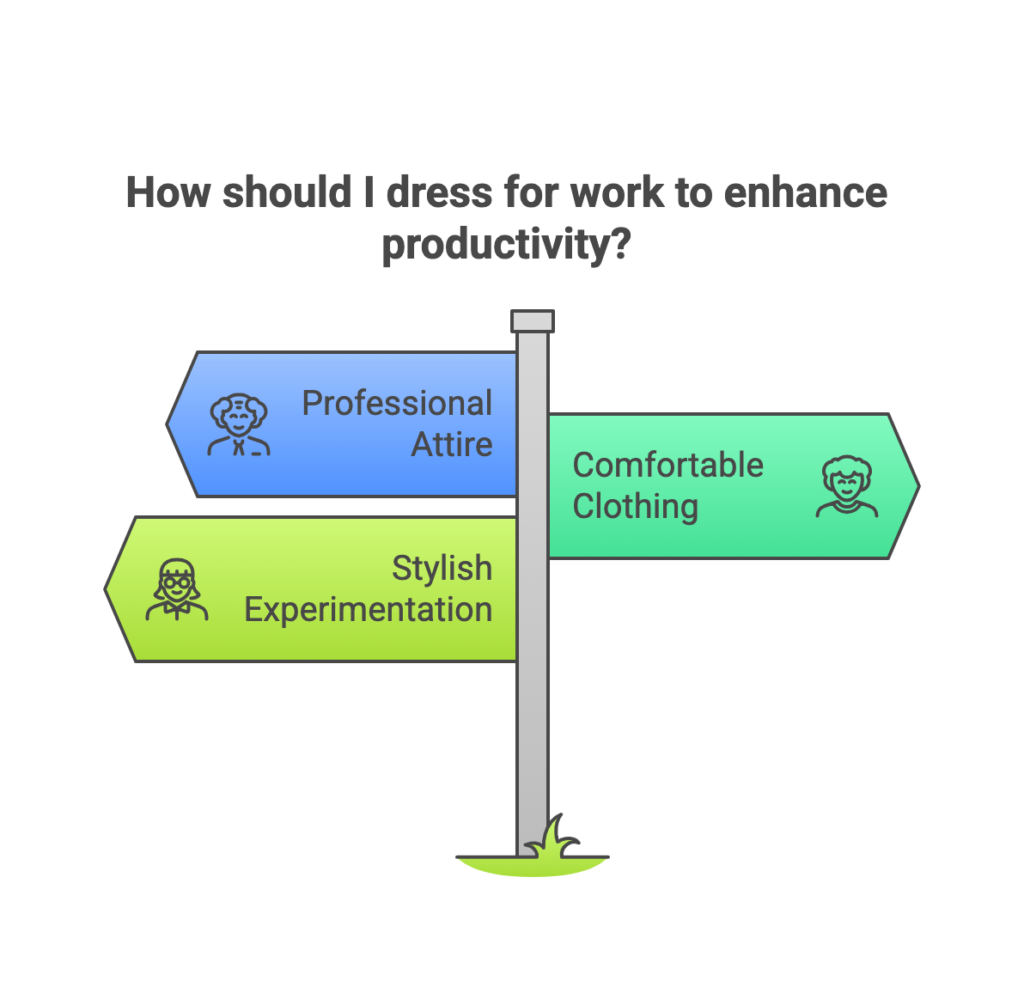
- Mindset Shift: Putting on work attire signals to your brain that it’s time to switch into work mode. It helps you mentally transition from leisure to productivity.
- Professionalism: Dressing professionally can boost your confidence and help you maintain a professional mindset. This can lead to improved focus and motivation.
- Comfort and Efficiency: Choose comfortable clothing that allows you to move freely and focus on your work without distractions. Avoid overly casual attire that might make you feel too relaxed.
- Motivation and Inspiration: Dressing in a way that makes you feel good can boost your mood and motivation. It can also inspire you to put your best foot forward in your work.
Tips for Dressing for Work as a Freelance Translator:
- Choose comfortable and professional attire: Opt for clothing that is both comfortable and appropriate for a professional setting.
- Consider your work environment: If you frequently attend meetings or client visits, dress in attire that aligns with your industry standards.
- Experiment with different styles: Find clothing that makes you feel confident and motivated.
6. Plan Your Day the Night Before
Planning your day in advance is a crucial productivity habit for freelance translators. By preparing for the next day before you end your current workday, you can:
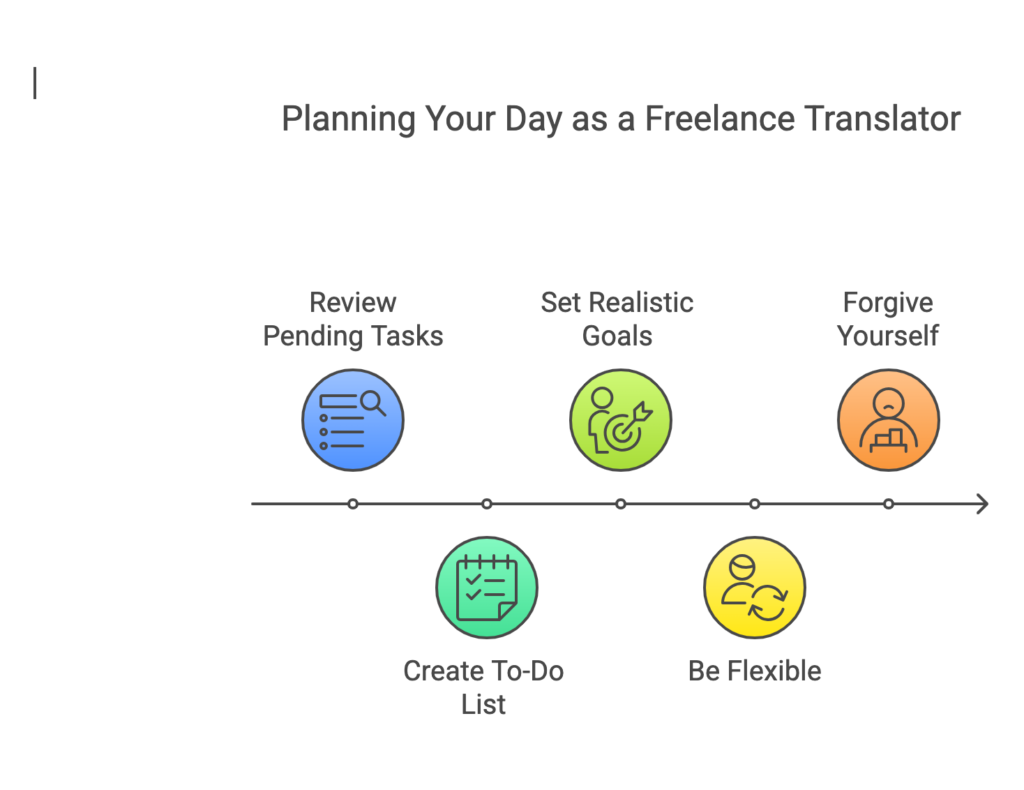
- Start with a Clear Focus: Begin your day with a clear understanding of your priorities and tasks, avoiding the confusion and wasted time of planning on the fly.
- Reduce Stress: Planning ahead can help you anticipate potential challenges and avoid feeling overwhelmed.
- Improve Time Management: By outlining your tasks and allocating time for each, you can effectively manage your workload and avoid procrastination.
Here’s how to effectively plan your day:
- Review Pending Tasks: Before ending your workday, review your unfinished tasks and prioritize them for the next day.
- Create a To-Do List: Outline your tasks for the following day and estimate the time required for each.
- Set Realistic Goals: Set achievable goals based on your workload and capabilities.
- Be Flexible: Be prepared to adjust your plans as unexpected tasks or challenges arise.
- Forgive Yourself if You Cannot Finish Everything: Reward yourself for completing tasks or achieving milestones to stay motivated.
Remember, planning your day is not about rigidly adhering to a schedule but rather about creating a framework that helps you stay organized and focused. By planning ahead, you can improve your productivity, reduce stress, and achieve your goals as a freelance translator.
7. Prioritize
Effective time management and planning are crucial for freelance translators to maintain productivity and meet deadlines. During office hours you have to be strategic about how you use your time. You need to be aware of which tasks are important and which are not, which tasks need to be done now and which can wait. Here are some strategies to help you optimize your time and achieve your goals:
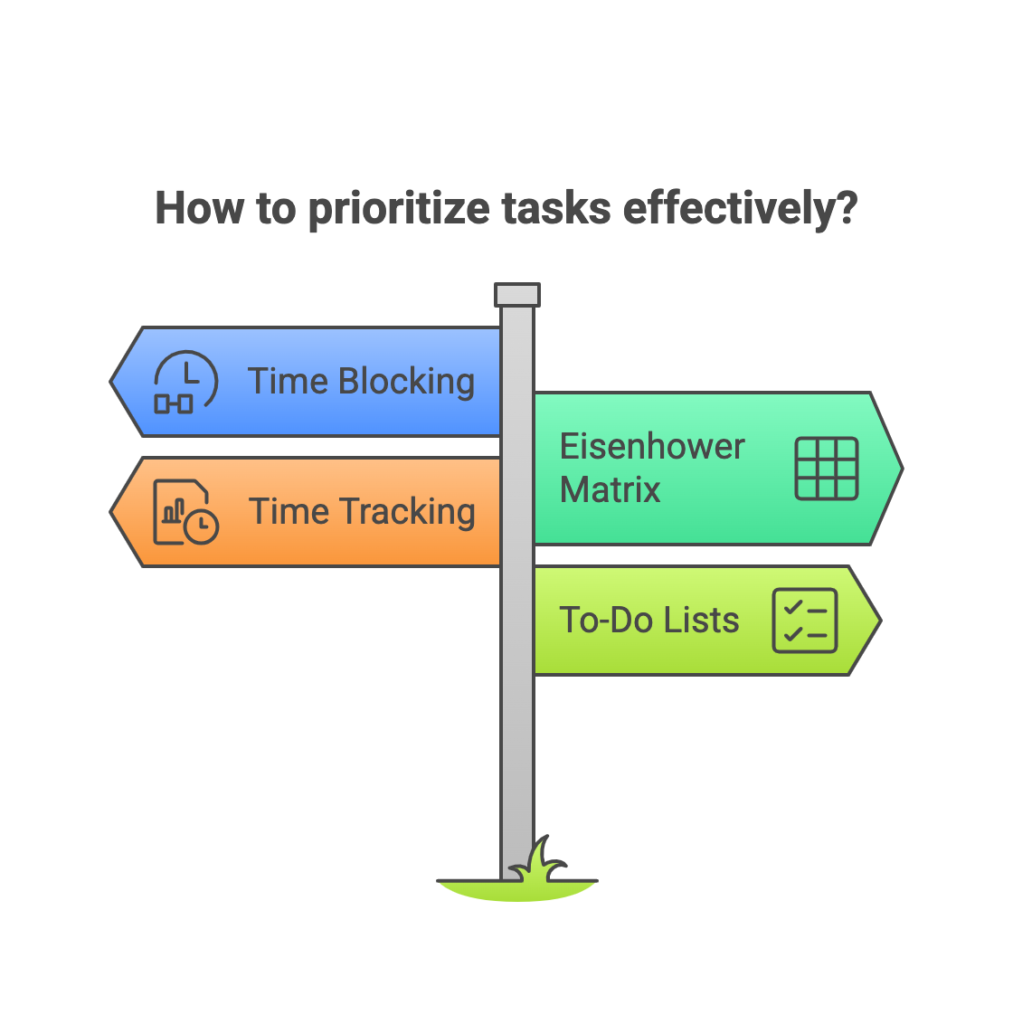
- Time Blocking: Allocate specific time blocks for different tasks to prioritize and manage your workload effectively.
- Eisenhower Matrix: Prioritize tasks based on urgency and importance.
- Time Tracking: Use time tracking tools to understand how you spend your time and identify areas for improvement.
- To-Do Lists: Create daily or weekly to-do lists to prioritize tasks and stay organized.
8. Manage Your Projects
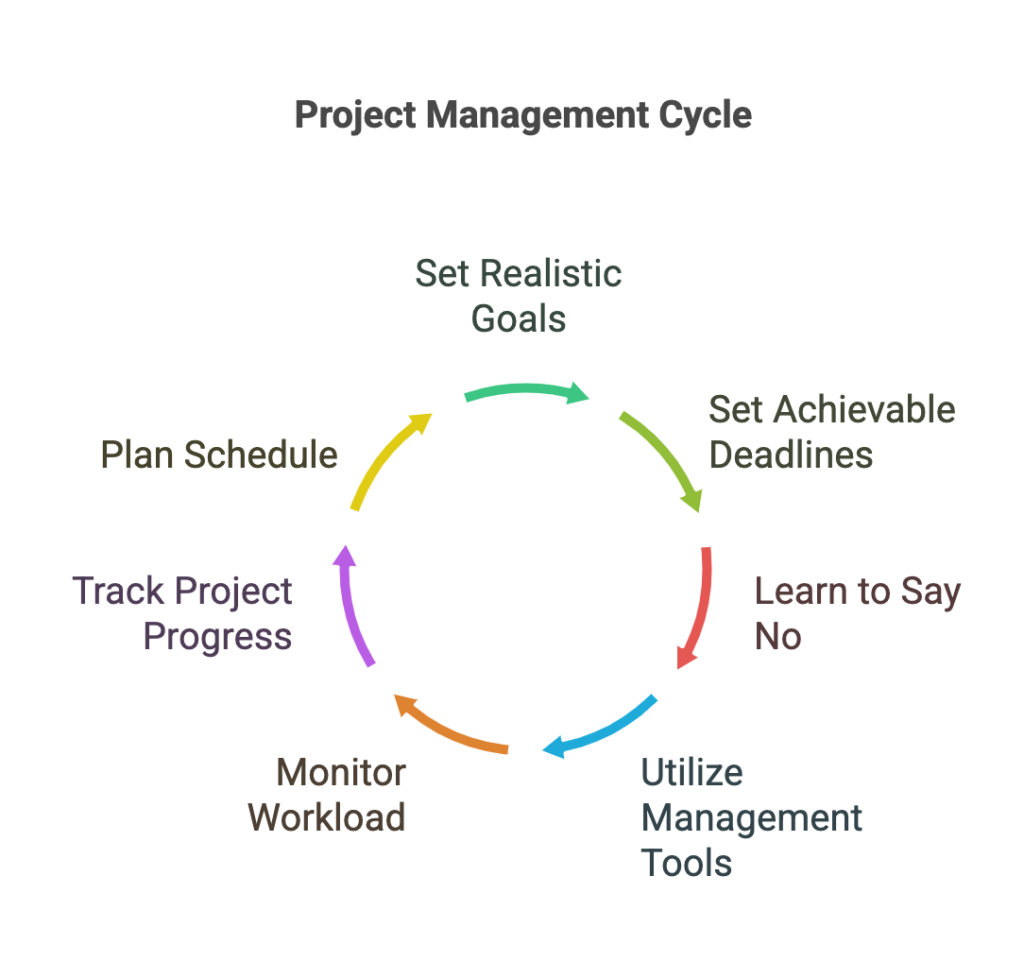
- Set Realistic Goals: Break down large projects into smaller, manageable tasks with realistic deadlines to avoid feeling overwhelmed.
- Set Achievable Deadlines: Set realistic deadlines for each task to avoid feeling overwhelmed.
- Learn to Say No: Don’t overcommit yourself. If you’re already stretched thin, politely decline additional work to maintain a manageable workload.
- Effective Project Management: Utilize project management tools or techniques to track your progress, prioritize tasks, and allocate resources efficiently.
- Workload Management: Keep a close eye on your workload to ensure you’re not taking on more than you can handle. This will help you avoid rushing, compromising quality, or missing deadlines.
- Project Tracking: Implement a system to track the status of your projects, including deadlines, progress, and any potential issues. This will help you stay organized and ensure timely delivery.
- Daily or Weekly Planning: Create a daily or weekly schedule to outline your tasks and allocate time for each.
9. Avoid Multitask
By avoiding multitasking and focusing on one task at a time, you can improve your efficiency, reduce errors, and achieve your goals as a freelance translator.
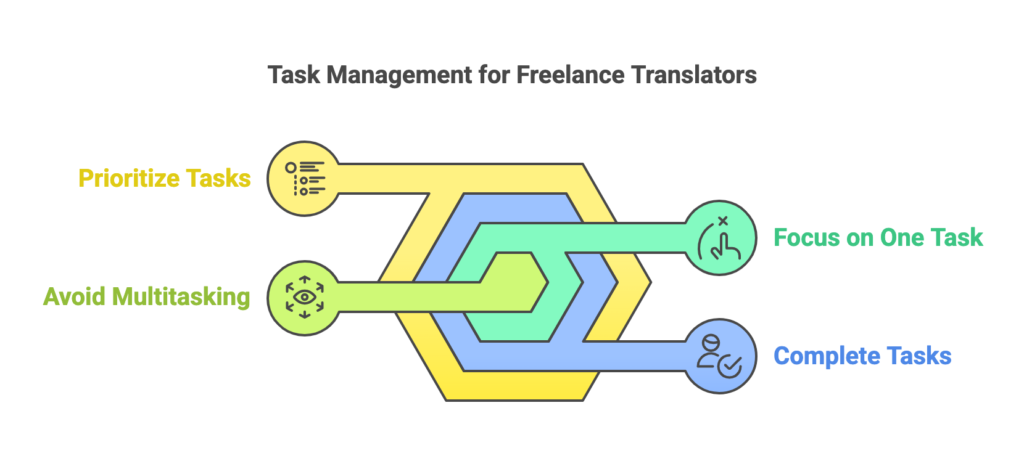
- Focus on One Task: To improve efficiency and reduce errors, concentrate on one task at a time. Multitasking can lead to decreased productivity and increased stress.
- Complete Tasks: Finish tasks to completion before moving on to the next one. This helps prevent unfinished work from piling up and causing unnecessary stress.
- Prioritize Tasks: Prioritize tasks based on importance and urgency to ensure that you focus on the most critical tasks first.
10. Batch Tasks
With task batching you can streamline your workflow, reduce distractions, and improve your overall productivity as a freelance translator.
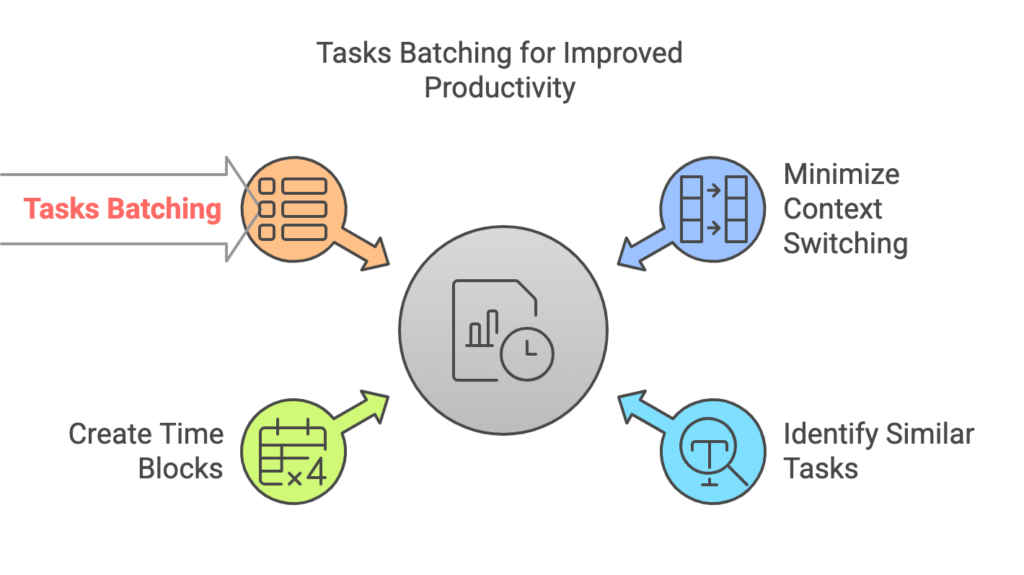
- Minimize Context Switching: Batching similar tasks together can significantly reduce the time wasted on switching between different types of work. This allows you to maintain focus and improve efficiency.
- Identify Similar Tasks: Group tasks based on their nature, subject matter, or required skills. For example, batch all client emails, research tasks, or editing projects together.
- Create Dedicated Time Blocks: Allocate specific time blocks for each type of task to ensure focused and uninterrupted work.
- Batching Examples: Consider batching administrative tasks on a particular day, scheduling client calls on specific days, or dedicating blocks of time for content creation.
11. Track Your Performance
Tracking your performance is essential for identifying areas for improvement and optimizing your productivity as a freelance translator. By monitoring your activities and habits, you can gain valuable insights into your work patterns and make data-driven decisions to enhance your efficiency.
Key metrics to track include:
- Most Productive Times: Identify the times of day when you feel most energized and focused.
- Translation Speed: Measure your translation speed to assess your efficiency and identify areas for improvement.
- Break Frequency and Duration: Analyze how often you need breaks and the optimal length of those breaks.
- Task Completion: Track your progress on different projects to assess your productivity and identify potential bottlenecks.
By tracking these metrics, you can:
- Optimize Your Routine: Adjust your work schedule to align with your most productive times.
- Improve Efficiency: Identify and eliminate time-wasting activities or distractions.
- Set Realistic Goals: Set achievable goals based on your productivity levels.
- Monitor Progress: Track your progress over time to measure your improvement and celebrate your achievements.
Consider using productivity tracking tools or journaling to record your daily activities and analyze your performance. This data can provide valuable insights to help you optimize your workflow and maximize your productivity as a freelance translator.
12. Time Yourself & Take Breaks
Taking regular breaks is essential for maintaining productivity and preventing burnout as a freelance translator. By scheduling breaks throughout your workday, you can rest your mind, reduce stress, and improve your overall focus.
Here are some effective strategies for incorporating breaks into your routine:
- Pomodoro Technique: Work in focused 25-minute intervals followed by short breaks. This technique helps you maintain concentration and avoid burnout.
- Timed Breaks: Set specific times for your breaks to ensure you take them regularly.
- Short Breaks: Take short breaks every 60-90 minutes to rest your eyes, stretch, and clear your mind.
- Longer Breaks: Schedule longer breaks throughout the day, such as a lunch break or a break to go for a walk.
- Vacation Time: Plan regular vacations to recharge and prevent burnout.
Remember, taking breaks is not a waste of time but rather an investment in your long-term productivity and well-being. By prioritizing rest and relaxation, you can avoid burnout and maintain a sustainable pace throughout your freelance career.
13. Use Email Templates
Leveraging email templates can significantly streamline your workflow and save you time. By creating reusable templates for common email tasks and establishing standardized procedures, you can automate repetitive tasks, improve consistency in your communication, and free up more time for focused work.
Here’s how to implement email templates:
- Identify Common Email Tasks: Determine the types of emails you frequently send, such as client inquiries, proposals, or invoices.
- Create Templates: Draft well-structured email templates for each common task, customizing them with placeholders for variable information.
- Use Text Expanders: Consider using text expanders to quickly insert pre-written text snippets into your emails.
14. Leverage Technology
Leveraging technology can significantly enhance your productivity and the ability to deliver high-quality translations. There are numerous tools available to streamline your workflow, improve efficiency, and ensure accurate translations.
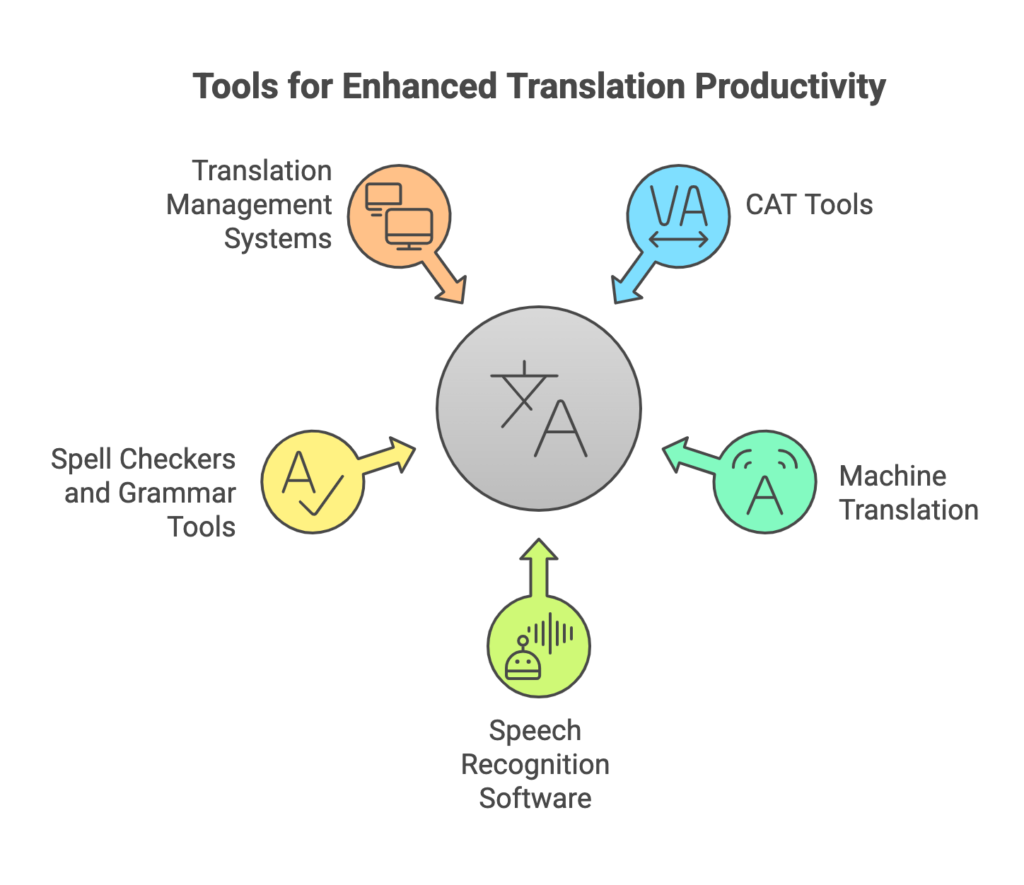
Here is what you may need to use:
- CAT Tools: Computer-Assisted Translation (CAT) tools can help you work on multiple projects simultaneously, track your progress, and maintain translation consistency. They also create translation memories to reduce search time for frequently used terms.
- Machine Translation: While machine translation can be a helpful tool, it’s essential to use it judiciously and proofread carefully to ensure accuracy.
- Speech Recognition Software: For audio-based translations, speech recognition software can help transcribe and analyze audio files efficiently.
- Spell Checkers and Grammar Tools: Utilize spell checkers and grammar tools to identify and correct errors in your translations.
- Translation Management Systems (TMS): TMS platforms can facilitate collaboration with colleagues, manage projects, and store translation memories and term banks.
By effectively utilizing these technologies, you can:
- Increase Efficiency: Streamline your workflow and reduce the time spent on repetitive tasks.
- Improve Accuracy: Ensure the accuracy of your translations by using CAT tools and proofreading software.
- Enhance Collaboration: Collaborate effectively with colleagues and clients using translation management systems.
- Stay Updated: Keep up with the latest technological advancements in the translation industry to maintain a competitive edge.
Remember to choose the tools that best suit your needs and workflow, and invest time in learning how to use them effectively.
15. Learn to Touch Type
Mastering touch typing can significantly boost your productivity as a freelance translator. By typing without looking at the keyboard, you can increase your typing speed, reduce errors, and improve your overall efficiency.
Here’s how to learn touch typing:
- Online Tutorials and Tools: Utilize online resources like Typing Club, Dance Mat Typing, Keybr, or Typing Study to practice and improve your touch typing skills.
- Consistent Practice: Dedicate regular time to practice touch typing to build muscle memory and improve your speed and accuracy.
- Patience and Persistence: Learning touch typing may take time and effort, but the benefits are well worth it.
Benefits of Touch Typing:
- Increased Typing Speed: Type faster and more accurately, saving time on your translation projects.
- Reduced Errors: Minimize typos and mistakes, improving the quality of your work.
- Improved Focus: Typing without looking at the keyboard allows you to focus more on the content and less on the mechanics of typing.
- Ergonomics: Touch typing can help prevent repetitive strain injuries associated with typing.
By investing time in learning touch typing, you can significantly enhance your productivity and efficiency as a freelance translator.
16. Listen to Background Noise for Deep Work
By incorporating background noise into your work routine, you may find that it can significantly improve your productivity and concentration.
- Focus Enhancement: Certain types of background noise, such as brown noise, can help you focus and improve productivity.
- Noise Types: Explore classical, ambient music, smooth jazz, or nature sounds for a relaxing and distraction-free listening experience.
- Avoid Lyrics: Opt for music without lyrics to prevent distractions and maintain focus.
- Low Volume: Play the music at a low volume to create a calming atmosphere without overwhelming your senses.
Benefits of Using Background Noise:
- Improved Focus: Background noise can help block out distractions and create a more focused environment.
- Reduced Stress: Listening to calming sounds can help reduce stress and anxiety.
- Increased Creativity: Some studies suggest that background noise can stimulate creativity and enhance problem-solving abilities.
Experiment with Different Types of Noise:
- Personal Preference: Everyone responds differently to different types of noise. Try various options to find what works best for you.
- Online Resources: Explore online platforms like YouTube or Spotify for curated playlists of focus-enhancing sounds.
17. Take Care of Your Health
Prioritizing your physical and mental health is crucial for maintaining long-term productivity as a freelance translator. An unhealthy body and mind can significantly impact your focus, energy levels, and overall well-being.
Here are some essential self-care tips:
- Healthy Lifestyle: Maintain a balanced diet, exercise regularly, and get enough sleep.
- Mindfulness and Meditation: Practice mindfulness techniques or meditation to reduce stress and improve focus.
- Regular Check-ups: Schedule regular check-ups with your doctor to monitor your physical and mental health.
- Avoid Burnout: Take breaks, set realistic goals, and avoid overworking yourself to prevent burnout.
- Seek Support: If you’re struggling with stress, anxiety, or other mental health issues, don’t hesitate to seek professional help.
By taking care of your health, you can:
- Increase Energy Levels: A healthy body and mind can boost your energy levels and improve your focus.
- Reduce Stress: Self-care practices can help you manage stress and avoid burnout.
- Improve Mental Clarity: A healthy lifestyle can enhance your cognitive function and problem-solving abilities.
- Maintain Productivity: By taking care of yourself, you can sustain your productivity over the long term.
Prioritizing your health is not just about avoiding illness; it’s about investing in your overall well-being and ensuring that you can perform at your best as a freelance translator.
18. Improve Your Sleep
Prioritizing sleep is essential for maintaining productivity and overall well-being as a freelance translator. Inadequate sleep can lead to fatigue, decreased focus, and reduced cognitive function.
Here are some tips for improving your sleep quality:
- Establish a Sleep Schedule: Maintain a consistent sleep schedule, going to bed and waking up at the same time each day.
- Create a Sleep-Conducive Environment: Ensure your bedroom is dark, quiet, and cool.
- Limit Screen Time: Reduce screen exposure before bed, as the blue light emitted from devices can interfere with sleep.
- Avoid Stimulants: Limit caffeine and alcohol consumption, especially close to bedtime.
- Manage Stress: Practice relaxation techniques like meditation or deep breathing to reduce stress and improve sleep quality.
By making sleep a priority, you can:
- Increase Energy Levels: Improve your focus and concentration throughout the day.
- Enhance Mood: Sleep deprivation can contribute to mood disorders and irritability.
- Improve Decision-Making: Adequate sleep is essential for clear thinking and sound decision-making.
- Boost Productivity: A well-rested mind is more productive and efficient.
Remember, sleep is an essential investment in your overall health and well-being. By prioritizing sleep, you can enhance your productivity and achieve your goals as a freelance translator.
19. Continue Learning and Developing Skills
As a freelance translator, staying updated with industry trends, technologies, and best practices is essential for maintaining your competitiveness and providing high-quality services.
Here are some strategies for continuous learning and skill development:
- Industry Research: Stay informed about the latest developments in the translation industry, including new technologies, emerging markets, and changes in client expectations.
- Professional Development: Invest in professional development activities such as attending conferences, webinars, or workshops.
- Online Courses: Take online courses or certifications to enhance your translation skills, learn new software, or specialize in a particular field.
- Mentorship: Seek mentorship from experienced translators to gain insights, guidance, and networking opportunities.
- Networking: Connect with other translators through online forums, social media groups, or industry events to exchange knowledge and learn from their experiences.
By prioritizing continuous learning and skill development, you can:
- Improve Translation Quality: Stay up-to-date with industry best practices and enhance your translation skills.
- Adapt to Change: Adapt to evolving client needs and market trends.
- Expand Your Knowledge: Gain expertise in new areas of translation or specialize in niche fields.
- Network with Professionals: Build relationships with other translators and industry experts.
Learning is an ongoing process. By investing in your professional development, you can position yourself as a highly skilled and sought-after freelance translator.
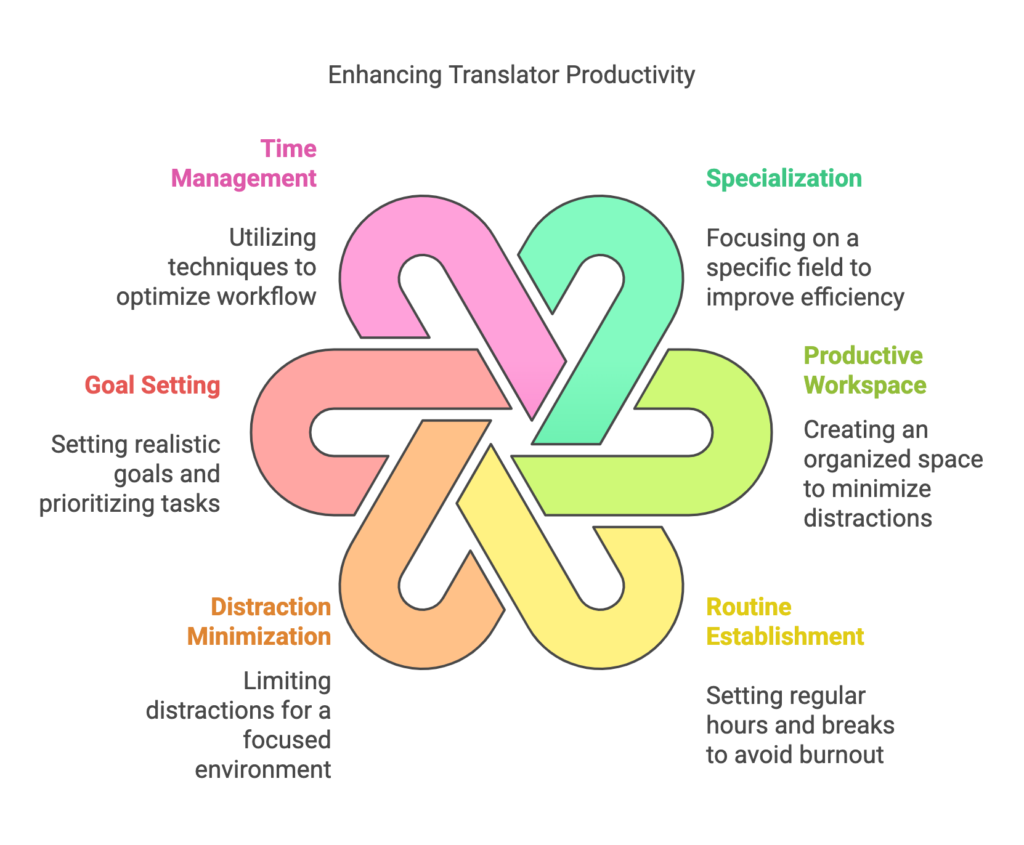
Here are the Key strategies for staying productive as a Translator:
Specialization: Focus on a specific field of translation to improve efficiency and expertise.
Productive Workspace: Create a dedicated and organized workspace to minimize distractions.
Routine Establishment: Set regular work hours, take breaks, and avoid burnout.
Distraction Minimization: Limit distractions and create a focused work environment.
Goal Setting: Set realistic goals and prioritize tasks effectively.
Time Management: Utilize time management techniques to optimize your workflow.
Continuous Learning: Stay updated on industry trends and invest in professional development.
Self-Care: Prioritize your physical and mental health to maintain a sustainable pace.
Productivity is not just about working hard but also working smart. By taking care of yourself, managing your time effectively, and continuously improving your skills, you can achieve greater success and satisfaction in your freelance translation career.
Are You Looking for Jobs in the Language Industry?
If you are looking for in-house jobs, you should check out Weekly Job Window.
Every week, we handpick in-house jobs for translators, interpreters, linguists, writers, editors, and localization professionals so you can stay updated without searching hundreds of listings spread across the internet.
You can access the latest jobs of the current week here. Feel free to bookmark it as well.
To get the full list every week to your inbox, subscribe.
